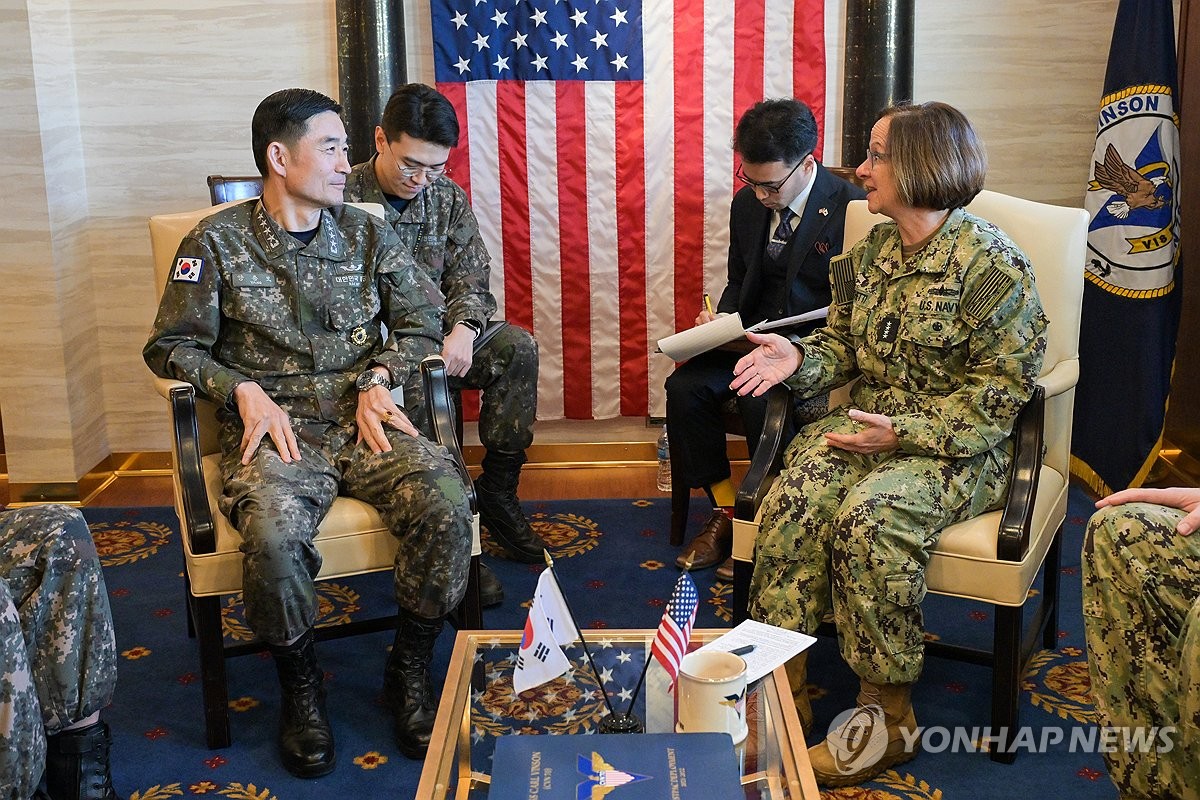- California Assembly OKs highest minimum wage in nation
- S. Korea unveils first graphic cigarette warnings
- US joins with South Korea, Japan in bid to deter North Korea
- LPGA golfer Chun In-gee finally back in action
- S. Korea won’t be top seed in final World Cup qualification round
- US men’s soccer misses 2nd straight Olympics
- US back on track in qualifying with 4-0 win over Guatemala
- High-intensity workout injuries spawn cottage industry
- CDC expands range of Zika mosquitoes into parts of Northeast
- Who knew? ‘The Walking Dead’ is helping families connect
U.S. Navy chief stresses America’s focus on Indo-Pacific during Asia trip
The new U.S. chief of naval operations (CNO) highlighted America’s focus on the Indo-Pacific on Friday, saying “no matter what happens,” the U.S. Navy is operating forward in the region, where Washington’s “foremost priority” lies.
Adm. Lisa Franchetti made the remarks amid lingering concerns that the United States’ strategic focus on the region could wane in the midst of the war between Israel and the Hamas militant group and Russia’s prolonged war against Ukraine. She assumed command on Nov. 2.
“This region remains America’s foremost priority, and that is why no matter what is happening around the world, the U.S. Navy continues to deploy and operate forward here in the Indo-Pacific,” Franchetti said in an online press meeting as she was in Busan, 320 kilometers southeast of Seoul, as part of her trip to the region.
The admiral pointed out that the U.S.’ national security strategy directs the Department of Defense to act “urgently” to sustain and strengthen deterrence in the Indo-Pacific and to do so alongside the U.S.’ allies and partners.
“That has been a common thread across each of my engagements: our shared commitment to a free and open Indo-Pacific. Our alliances underpin the stability, the security, of this region, and facilitate the preservation of the rules-based international order,” she said.
Accentuating the U.S. pursuit of stronger collaboration with regional allies, Franchetti said that the U.S. Navy is training, exercising and cooperating with them so that it is not just interoperable with them, but also “interchangeable” where possible.
“Our allies must be fully integrated into our planning and our operations,” she said.
Asked when the plan by South Korea, the U.S. and Japan to operationalize a trilateral system for the real-time sharing of North Korean missile warning data will be implemented, the admiral did not give a direct answer.
“I am very excited about the opportunities for multilateral cooperation, especially trilateral cooperation in this region, and I look forward to the development of a plan to further enhance that trilateral cooperation going forward,” she said.
Touching on lingering concerns over whether the U.S. can handle multiple security challenges in the region and beyond, Franchetti underscored the “global” coverage of the U.S. Navy.
“We operate effectively all around the world. We’re effectively postured to work all around the world,” she said.
“I, as CNO, prioritize sending our most up-to-date capabilities there with our best trained people, and I am confident in the 7th Fleet’s ability to deter and to operate freely alongside our partners, and that they are always going to be ready to respond to anything that comes their way,” she added.
She was referring to the U.S. 7th Fleet headquartered at Yokosuka, Japan. The fleet, the largest of the forward-deployed U.S. fleets, boasts extensive naval capabilities, including the nuclear-powered USS Ronald Reagan (CVN 76) aircraft carrier.
Touching on China’s growing assertiveness in the South China Sea, the admiral repeated America’s basic position.
“As it pertains to China’s recent provocations, dangerous maneuvers against the U.S. aircraft and ships operating in the South China Sea, we are committed to preserving the rights of all nations to fly, sail, and operate safely and responsibly wherever international law allows,” she said.
Franchetti particularly noted, “No member of the international community should be intimidated or coerced into giving up their rights and freedoms.”












